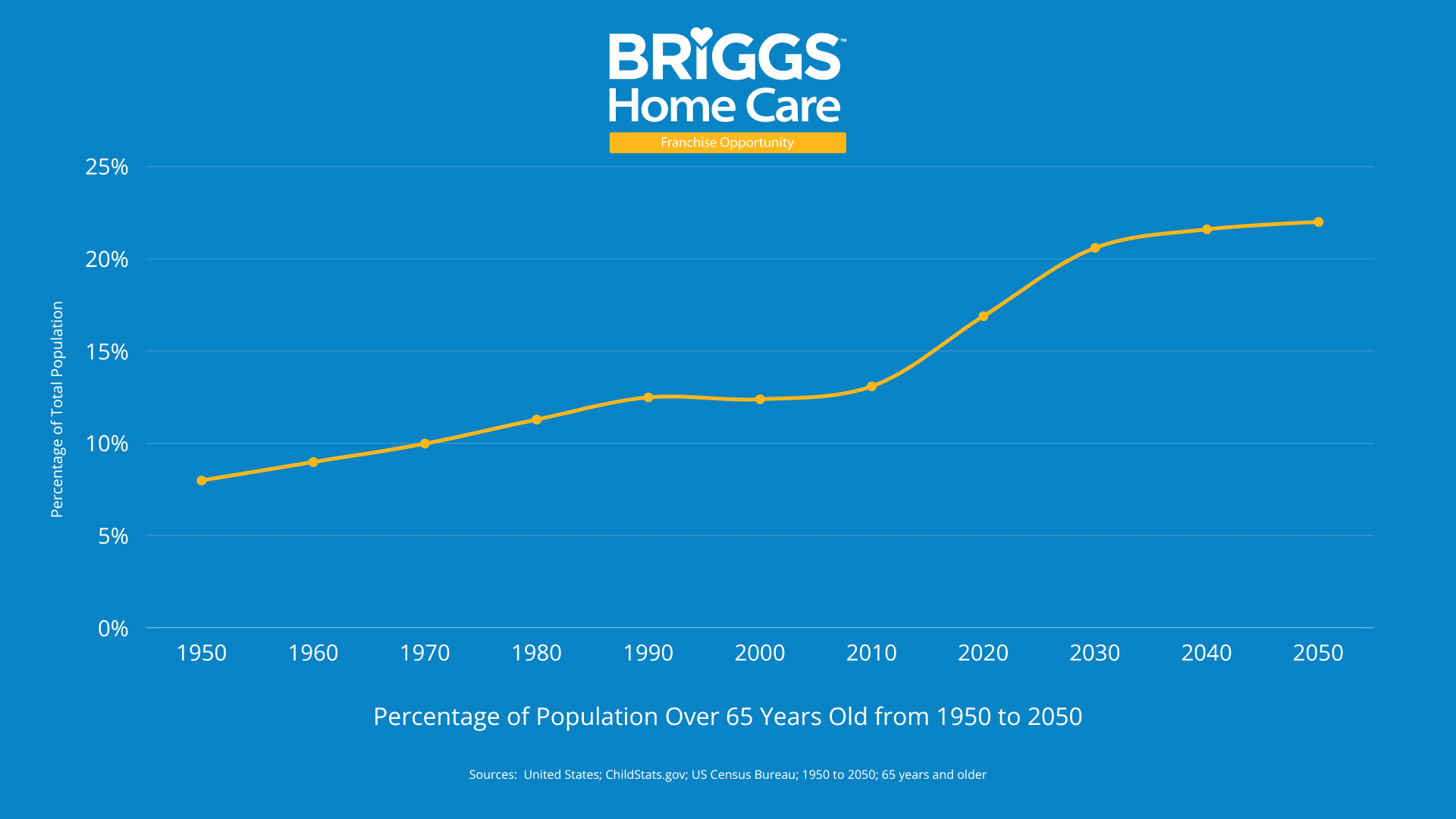It's Good To Be Cared For. It's Great To Be Cared About!
It's Good To Be Cared For. It's Great To Be Cared About!
Helpful content to guide you on your journey to becoming a home care franchise owner.

The aging of the population is one of the most significant demographic trends of our time. According to the United Nations, the number of people aged 60 and over is projected to double by 2050 and triple by 2100. In many developed countries, including the United States, Japan, and most of Europe, the proportion of seniors in the population is already at historic highs, and this trend is expected to continue in the coming decades.
As the population ages, the demand for health care services is increasing, particularly the demand for home care services. Home care services provide essential support to seniors who want to age in place but may require assistance with activities of daily living, managing chronic conditions, or simply companionship. Home care can help seniors maintain their independence, quality of life, and social connections while reducing the burden on family caregivers and the healthcare system.
In this article, we’ll explore why the aging population is driving the demand for home care and the challenges and opportunities facing the home care industry as it seeks to meet the needs of seniors and their families.
As the population ages, the need for health care services is increasing, and in particular, the need for home care services. Home care services provide essential support to seniors who want to age in place but may require assistance with activities of daily living, managing chronic conditions, or simply companionship. Let’s take a closer look at why the aging population needs home care:
Chronic health conditions, such as heart disease, diabetes, and arthritis, are more prevalent in seniors than in younger adults. In fact, according to the National Council on Aging, approximately 80% of older adults have at least one chronic health condition, and 68% have two or more. These conditions can make it difficult for seniors to manage their health and maintain their independence, which is where home care can help.
Cognitive decline is another common issue that affects many seniors. Dementia, Alzheimer’s disease, and other forms of cognitive impairment can make it challenging for seniors to remember to take their medication, follow a healthy diet, or even complete basic tasks. Home care providers can offer support and assistance to seniors with cognitive decline, helping them to maintain their quality of life and independence.
Physical limitations can make it challenging for seniors to complete daily tasks, such as bathing, dressing, and preparing meals. Home care providers can offer assistance with these tasks, as well as help seniors with mobility issues get around their homes safely.
Social isolation is a significant issue for many seniors, particularly those who live alone or have limited mobility. Home care providers can offer companionship and socialization, helping seniors to stay connected to their communities and maintain their mental and emotional well-being.
In the next section, we’ll take a closer look at the growing demand for home care services in response to the needs of the aging population.
As the aging population continues to grow, so does the demand for home care services. Here are some of the reasons why:
The baby boomer generation, born between 1946 and 1964, is one of the largest generations in history, and as they age, they are driving the demand for home care services. According to AARP, the number of Americans aged 65 and over is expected to reach 98 million by 2060, with the majority of that growth coming from the baby boomer generation.
Many seniors prefer to age in place or remain in their own homes as they age, rather than move to an institutional setting such as a nursing home. Home care services allow seniors to do just that, by providing the support they need to remain in their homes safely and comfortably.
With the aging of the population, the number of quality caregivers is not keeping pace with the demand for care. According to the National Alliance for Caregiving, there are currently 43.5 million family caregivers in the United States, but this number is expected to decline as the population ages and family structures change. Home care services can help fill the gap, providing essential support to seniors who may not have family members available to provide care.
Home care services can also be a more cost-effective option than institutional care. According to the Genworth Cost of Care Survey, the average cost of a private room in a nursing home in 2020 was $8,821 per month, while the average cost of a home health aide was $4,481 per month. For seniors who require only non-medical home care services, the cost can be even lower.
As a result of these factors, the demand for home care services is growing rapidly. In the next section, we’ll take a closer look at how home care services can help meet the needs of the aging population.

Home care services can help meet the needs of the aging population by providing a range of services that allow seniors to remain in their own homes while receiving the care and support they need. Here are some of the types of home care services available:
Personal care services provide assistance with activities of daily living, such as bathing, dressing, and grooming. Personal care providers can also help with toileting and incontinence care, as well as mobility assistance.
Companion care services provide socialization and emotional support for seniors who may be experiencing social isolation or loneliness. Companion care providers can offer conversation, games and activities, and even transportation to social events or appointments.
Homemaking services provide assistance with household tasks such as cleaning, laundry, and meal preparation. Homemaking providers can also assist with grocery shopping and running errands.
Respite care services offer temporary relief for family caregivers, allowing them to take a break from their caregiving responsibilities while ensuring that their loved one receives the care they need.
Skilled nursing services provide medical care and support for seniors with complex medical needs, such as wound care, medication management, and infusion therapy.
Rehabilitation services provide physical, occupational, or speech therapy to help seniors recover from injury or illness and regain their independence.
Home care services can provide a range of benefits for seniors and their families. For seniors, home care can help maintain their independence, improve their quality of life, and reduce their risk of hospitalization. For family caregivers, home care can provide much-needed support and respite, reducing the burden of caregiving and helping to prevent burnout.
In the next section, we’ll take a closer look at the importance of quality home care services, along with some of the challenges and opportunities facing the industry.
The growing demand for home care services presents both challenges and opportunities for the home care industry. Here are some of the key challenges facing the industry:
One of the biggest challenges facing the home care industry is a shortage of qualified caregivers. The demand for home care services is outpacing the supply of qualified caregivers, making it difficult for home care agencies to provide consistent, high-quality care.
The home care industry is subject to a variety of regulations and licensing requirements at the federal, state, and local levels. These regulations can be complex and vary from state to state, making it difficult for home care agencies to navigate the regulatory landscape.
Home care providers require specialized training to provide high-quality care to seniors, but there is currently no standardized training program for home care providers. This can lead to inconsistencies in the quality of care provided by different home care agencies.
Despite these challenges, the growing demand for home care services also presents significant opportunities for the home care industry. Here are some of the key opportunities:
Advances in technology and telehealth are transforming the home care industry, making it easier for seniors to receive high-quality care in their own homes. From remote monitoring to telemedicine, technology, and telehealth are helping to improve the quality of care and reduce the burden on caregivers.
Franchising offers opportunities for home care business owners to grow and expand their services. By franchising and expanding into new geographic areas, home care entrepreneurs can increase their reach and provide care to more seniors.
In order to meet the growing demand for home care services, the industry will need to address the challenges it faces and take advantage of the opportunities presented by new technologies and business models.
The aging population is driving the demand for home care services, and this demand is only going to continue to grow in the coming years. Home care services offer a range of benefits for seniors and their families, and the industry has a significant role to play in meeting the needs of the aging population. By addressing the challenges facing the industry and taking advantage of new opportunities, home care businesses can help ensure that seniors receive the high-quality care they deserve.
If you are interested in meeting the growing demand for home care services and making a difference in the lives of an aging population, consider becoming a part of the Briggs Home Care Franchisee. Our franchise model offers the training, support, and resources you need to start and grow your own home care business. Contact us today to learn more about how you can become a part of the Briggs Home Care family.